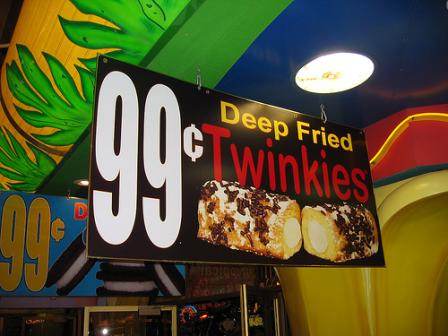While much of the globe is constantly faced with scarcity, disease and starvation, the Western world insists on self-inflicted suffering via those American Dreams we’ve got our chubby fingers so tightly wrapped around. As strange as it may be to comprehend, many Americans are literally starving themselves through gluttonous over-indulgence. Author John Robbins (Diet for a New America, The Food Revolution) has noted that there are equal numbers of people in the world (roughly 1.2 billion of each group) suffering from diseases related to poverty and from diseases of affluence like heart disease, obesity and diabetes. There are different ways to skin a rabbit, as the saying goes — and leave it to Americans to discover that apparently even stuffing it works.
Unprecedented calls to action to “be green” are sending mixed messages and leaving consumers confused about their choices. Hybrid cars, energy credits, and recycling are mainstream topics while perhaps the biggest way we can make a difference for ourselves, our families and our community is in the foods we eat — or don’t eat. Many people in the world still grow and harvest their own food, and they have an innately organic relationship with what they put inside their bodies, yet Americans need a decoder ring for navigation through super market aisles (which can be found at the bottom of a box of Lucky Charms cereal oddly enough…).
The packaged product revolution has made a lot of people rich and a lot more seriously unhealthy. Corn syrup and refined sugars have had such an obvious, gross effect on humans, yet we as a nation seem stunned, paralyzed by the trend that’s feeding on our children like a parasite. And while the Whole Foods Revolution is sweeping the nation, it’s catering to an obvious audience and creating more questions about what’s really safe to eat in this country.
In a city like New York, now home to 5 Whole Foods Markets on the island (Tribeca opens July 9), the unhealthy foods far outweigh the healthier options. But as healthy options seem to increase, identifying the healthy choices becomes increasingly difficult. Box after box of “organic” foods line the Whole Foods aisles, boasting claims that may or may not be accurate. What’s more, as the little organic-health-food-brand-that-could makes its way over the hillside into conventional grocery stores, it finds itself needing to sell off chunks of the business to VC’s and investors just to stay alive. Some companies have completely surrendered full ownership and all that’s left is the guise of a brand that maybe once was pure and wholesome that’s now steered by Madison Avenue Marketing Moguls and single bottom-line Corporate Agendas.
Nearly a decade ago, I was a broker for a delicious juice company called Mountain Sun, based out of a little town in Southern Colorado. They were the only organic apple juice growers and bottlers in the country. They gradually added more flavors to their line becoming a leading shelf-stable juice brand. Over time, production costs rose and retailers began to demand more slotting fees and promotions that were incredibly expensive. An investment group that had recently bought an even smaller company out of Pennsylvania called Walnut Acres approached Mountain Sun. For years, Walnut Acres had been making canned soups and a few other specialty items that were rarely found in stores outside of the east coast. They were a symbol of quality, hand-crafted wholesome foods. This VC group liked the name and image and had big plans for Walnut Acres in a short time frame. They bought Mountain Sun juices as well as a few other small industry brands that eventually all bore the name Walnut Acres.
As the new owners began blazing ahead with agendas and timelines, our sales team was in a meeting with them about the “future” of Mountain Sun / Walnut Acres. We were all handed $100 bills as a “welcome aboard” gesture. We were assured the quality of the juice that had made Mountain Sun an industry leader would not change. They would keep the Colorado plant open; they would still sell in glass bottles. All we could do is believe what was being told to us, never mind that something-feels-like-a-lie sensation in my stomach. Within a year, the company was sourcing its juice from China, in plastic bottles. We were fired and replaced by a bigger brokerage firm and within another year, maybe less, the entire faux-brand was sold to the organic products industry giant Hain Celestial, which owns over 40% of the brands sold in natural food stores.
This story is not unique. In fact, an overwhelming number of “organic and natural” products are now subsidiary brands of corporate giants like Kraft, Heinz, Coke, Pepsi, Clorox and Proctor & Gamble. It was not always this way. The Walnut Acres and Mountain Suns of this world (like The Bronner Family profiled recently here about their efforts to standardize “organic” in the personal care industry), held a high regard for quality and purity. But when the cost of doing business to that standard is no longer feasible, owners are forced into either losing money or letting the business go.
If you take into consideration how commerce works in this country, it shouldn’t really be a surprise. As do-gooders vie for a much-needed market share in the abhorrent American Grocery Stores, they’re forced to play a game of mark ups, promotions, and discounts that can and do kill brands. Genuine intentions and a commitment to healthy foods are not enough to keep Organic Product X on the shelves. It takes millions to sustain marketing efforts. This pattern of promoting foods — our sustenance — the same way we’re pitched a brand of luxury sofas is a side effect of the industrial revolution that decides what we like, when we buy it and how often.
This National Identity Crisis is brought to you by the logo somewhere on the computer you're staring into, the washing machine in your basement, the state-of-the-art bagless vacuum in your closet next to that good ol’ pair of Air Jordans that you still like to wear when you run out to pick up a case of Heineken and a tub of KFC for the Giants game you simply have to watch. It’s not your fault America, somewhere the Dream just quietly turned into a Nightmare. And now that we all know that marketers make tons of money by turning us into Logo Slaves, maybe we can start thinking for ourselves, even if it’s just a little bit. Ask yourself, do you really love the car you drive or do you love it because other people think you should love it and are willing to finance you to insure that you do?
We all know that an unhealthy person is probably not going to make the best decision. Even more unreliable are the choices made by someone who has an addiction to something — be it Marlboros or Grey’s Anatomy. But this is where we’re at, America. We’re over-caffeinated, deep-fried, and sugar coated flesh zombie versions of Homer J. Simpson thinking we have the acuity to elect the appropriate next leader of the “Free” World. As if we are even being offered a choice.
What about those healthy Americans — the good ol' Wall Street Type A obsessive health-addicted gym members, clinging to treadmills, power bars, protein shakes and meaningless political banter? Certainly there’s nothing inappropriate about a good amount of cardio to keep a person sane, but these Healthy Americans are un-healthy binge exercisers who do it so they can justify their controlled alcoholism, fashion-magazine-induced insecurity complexes, and carbohydrate addictions. All these issues may seem separate, but they are rooted in this country’s leap into enormous industry a hundred years ago. Some things, like food, probably shouldn’t have made that leap.
Humans are complex creatures, no question. Our diets require a much broader range of foods than those of the squirrel and our intelligent cousin the dolphin. But that can of Pringles that will stay fresh forever was better suited to house the ashes of the man who invented the canister (yep) than conveying something your body should take in as food.
Remember, America, polar ice caps are melting and forests are disappearing. Disease and discomfort is increasing with life expectancy. The world is overpopulated with humans while thousands of other species vanish forever every year. We have a lot of work to do, and we need to be healthy in order to tackle these challenges with agility and focus. We’re voting with our dollars as we invest in our health. Insurance companies and our own government do not want to see us healthy enough to realize just how un-empowered they intend to keep us.
There are of course a number of legitimate companies committed to healthy products for all of us, creating healthy sustainable financial models for suppliers, and promoting a genuinely healthy regard for the planet. [Full disclosure: I work with both of these companies:
Sambazon and Traditional Medicinals, both are award winners considered leading examples of triple bottom line businesses.] But this is all still within the commerce framework set in motion by our post World War Ramp-It-Up agenda. Quarterly sales numbers need to meet or exceed goals in order for people to keep their jobs. Brands have to commit themselves to pushing out new products every few months to stay fresh in consumers’ minds; they have to venture into new categories to satisfy market share growth goals. It’s a whole lot of Busy-ness staying in Business.
As the Greenwashing rains down like a hurricane that’s just come ashore, we’re going to see every brand in every category from toothpaste to tires boasting about their energy-saving, charity-giving, recycling, save-the-rainforest, wind-powered efforts, so that these issues will all begin to fade into the background, if they hasn’t already. Corporations are not doing this because they care about these issues, and not even because these actions can save them money, but because they create a false sense of loyalty to you, the Almighty Consumer, who they’ve conned into thinking that these values mean something. Your money matters so much that the CEO of BP is personally going to swim out into the arctic and rescue a polar bear to prove it.
Whole Foods Market has been boasting the slogan “Shop like you deserve it” on banners throughout New York City. Wait, didn’t we always deserve to have access to whatever we want — and more importantly, whatever is safest? When did health become a privilege?
It’s no wonder we’re confused.
But Shopping Smart doesn’t have to require a decoder ring if we keep in mind one simple rule: You Are What You Eat.
Companies that want to sell you a proprietary product — flavored sodas, chips, cookies, frozen meals, chocolate bars etc. — are all banking on you choosing a prefab meal. That choice is not healthy for you and the planet. Any product that comes in a box, can or jar has likely been harvested in one part of the world, processed in another, packaged in yet another and guzzled fossil fuels all the way to your local store.
We can all easily research the best options in these categories, and we’ll most likely discover that things like “Crystalline fructose” — the second ingredient in the ubiquitously “healthy” Vitamin Water — is really just refined High Fructose Corn Syrup (as if HFCS isn’t refined enough); that the “natural flavors” found in all sorts of “organic” potato chips, soups, frozen foods etc., can consist of pretty much anything at all, and definitely include concentrated amino acids, also known as MSG; that the isolated soy protein found in energy bars, cereals and breads is extracted with chemicals like hexane; and that, as truth warriors like David Bronner point out, soap companies with the word Organic in their brand name don’t even have to use organic ingredients in their products.
100 years ago, consumers knew where their food came from. Eggs and milk came from the farm on the edge of town, strawberries came from their next door neighbor, collards grew in their own yard, and the butcher might have been their son-in-law. The food chain was effortlessly transparent. And when it wasn’t, people asked questions. And believe it or not, this is still the case for many cultures today who have never seen a Twix bar.
We now live in a time where we can walk down the aisles of our local grocery store and peruse brand websites from our iPhones in real time. Access to every answer we should be seeking about the products we buy has probably never been easier. That’s power to the people — that’s an incredibly valuable option for staying informed and ultimately staying healthy. It looks like we’ve finally run out of excuses, America. Congratulations.
Check out http://www.organicconsumers.org for updates on organic standards in food and personal care.
photo by milkchug, courtesy of creative commons license













